客运承运人免责事由研究教学文案
- 格式:doc
- 大小:35.50 KB
- 文档页数:6
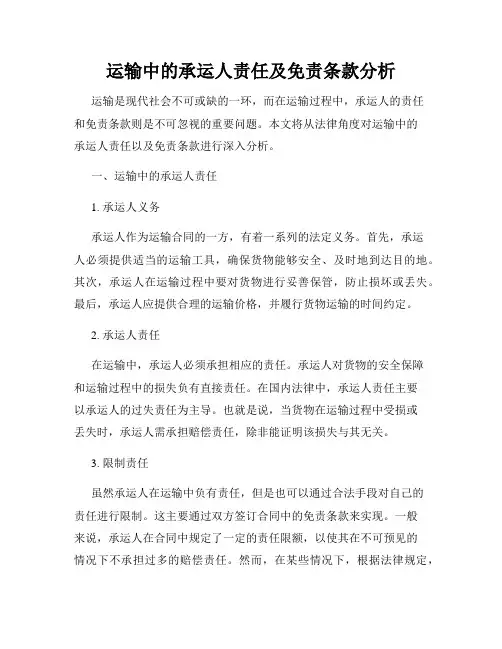
运输中的承运人责任及免责条款分析运输是现代社会不可或缺的一环,而在运输过程中,承运人的责任和免责条款则是不可忽视的重要问题。
本文将从法律角度对运输中的承运人责任以及免责条款进行深入分析。
一、运输中的承运人责任1. 承运人义务承运人作为运输合同的一方,有着一系列的法定义务。
首先,承运人必须提供适当的运输工具,确保货物能够安全、及时地到达目的地。
其次,承运人在运输过程中要对货物进行妥善保管,防止损坏或丢失。
最后,承运人应提供合理的运输价格,并履行货物运输的时间约定。
2. 承运人责任在运输中,承运人必须承担相应的责任。
承运人对货物的安全保障和运输过程中的损失负有直接责任。
在国内法律中,承运人责任主要以承运人的过失责任为主导。
也就是说,当货物在运输过程中受损或丢失时,承运人需承担赔偿责任,除非能证明该损失与其无关。
3. 限制责任虽然承运人在运输中负有责任,但是也可以通过合法手段对自己的责任进行限制。
这主要通过双方签订合同中的免责条款来实现。
一般来说,承运人在合同中规定了一定的责任限额,以使其在不可预见的情况下不承担过多的赔偿责任。
然而,在某些情况下,根据法律规定,承运人无法通过免责条款限制责任,比如故意造成的货物损失或人身伤害。
二、免责条款的合法性分析1. 合同自由原则合同自由原则是指当事人在平等、自愿的基础上,根据自己的意愿和利益,可以约定合同条款。
在运输合同中,承运人与托运人之间的签订是基于合同自由原则的。
因此,免责条款在合同中的适用是符合法律规定的。
2. 公平交易原则免责条款是否有效还需根据公平交易原则进行评估。
公平交易原则要求免责条款在内容上合理、合法,不得侵犯托运人的合法权益。
如果免责条款存在不合理的条款,或者对托运人的权益造成严重损害,则该条款可能被视为无效或不合法。
3. 强制性法规在某些情况下,法律规定了对承运人责任的强制要求,这意味着即使在合同中存在免责条款,也无法免除承运人的赔偿责任。
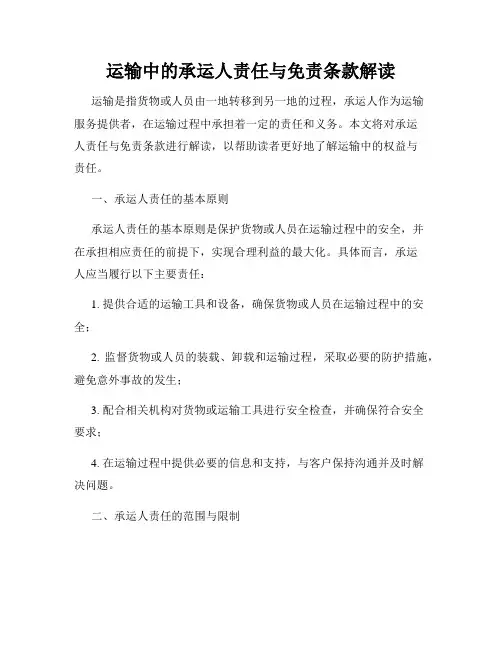
运输中的承运人责任与免责条款解读运输是指货物或人员由一地转移到另一地的过程,承运人作为运输服务提供者,在运输过程中承担着一定的责任和义务。
本文将对承运人责任与免责条款进行解读,以帮助读者更好地了解运输中的权益与责任。
一、承运人责任的基本原则承运人责任的基本原则是保护货物或人员在运输过程中的安全,并在承担相应责任的前提下,实现合理利益的最大化。
具体而言,承运人应当履行以下主要责任:1. 提供合适的运输工具和设备,确保货物或人员在运输过程中的安全;2. 监督货物或人员的装载、卸载和运输过程,采取必要的防护措施,避免意外事故的发生;3. 配合相关机构对货物或运输工具进行安全检查,并确保符合安全要求;4. 在运输过程中提供必要的信息和支持,与客户保持沟通并及时解决问题。
二、承运人责任的范围与限制在履行承运人责任的过程中,承运人可能面临一些风险和不可抗力因素,因此有必要对承运人责任的范围进行明确限制。
常见的承运人责任限制条款包括以下几方面:1. 不可抗力条款:对于因不可抗力因素导致的货物损坏、延误等情况,承运人可以免除或减轻责任。
不可抗力因素包括自然灾害、战争等不可预见和无法避免的情况;2. 货物价值限制:承运人对于货物损失或延误的赔偿金额通常有一定的限制。
这包括按重量、价值或特定标准进行赔偿的限制;3. 未遵循指令或约定的限制:如果货主未按约定的方式提供货物或未按要求提供所需文件,承运人可减轻或免除责任;4. 货物自身特性限制:某些货物具有特殊的性质或特征,如易碎品、危险品等,在运输过程中存在一定的风险。
承运人对此类货物的责任可能会有所限制。
三、货物保险的重要性及作用鉴于承运人责任的限制,货主在运输货物时应考虑购买货物保险,以保障自身权益。
货物保险的重要性体现在以下几个方面:1. 赔偿保障:货物保险能够对货物在运输过程中的损坏、丢失等风险进行赔偿,减轻货主的经济损失;2. 法律依据:货物保险作为合同的一部分,有法律约束力,确保货主的权益得到有效保障;3. 经济保障:在货物损坏或丢失时,货主可以通过货物保险获得相应的赔偿,避免因此而导致的经济困境;4. 提供专业服务:货物保险公司通常拥有丰富的经验和专业知识,能够为货主提供包括风险评估、风险管理等方面的服务。
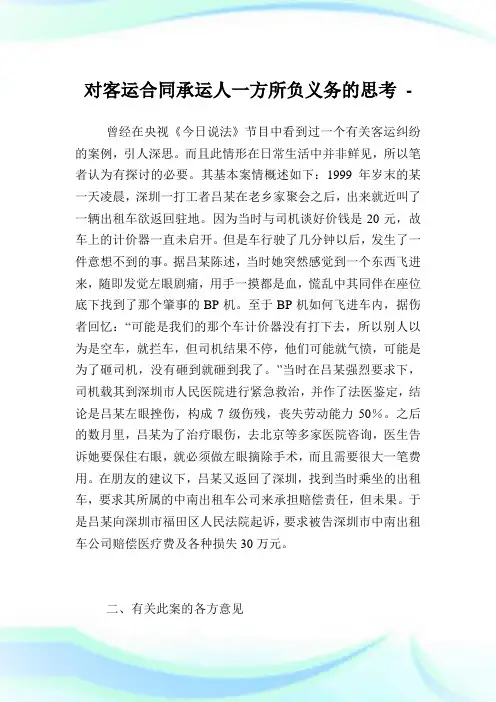
对客运合同承运人一方所负义务的思考-曾经在央视《今日说法》节目中看到过一个有关客运纠纷的案例,引人深思。
而且此情形在日常生活中并非鲜见,所以笔者认为有探讨的必要。
其基本案情概述如下:1999年岁末的某一天凌晨,深圳一打工者吕某在老乡家聚会之后,出来就近叫了一辆出租车欲返回驻地。
因为当时与司机谈好价钱是20元,故车上的计价器一直未启开。
但是车行驶了几分钟以后,发生了一件意想不到的事。
据吕某陈述,当时她突然感觉到一个东西飞进来,随即发觉左眼剧痛,用手一摸都是血,慌乱中其同伴在座位底下找到了那个肇事的BP机。
至于BP机如何飞进车内,据伤者回忆:“可能是我们的那个车计价器没有打下去,所以别人以为是空车,就拦车,但司机结果不停,他们可能就气愤,可能是为了砸司机,没有砸到就砸到我了。
”当时在吕某强烈要求下,司机载其到深圳市人民医院进行紧急救治,并作了法医鉴定,结论是吕某左眼挫伤,构成7级伤残,丧失劳动能力50%。
之后的数月里,吕某为了治疗眼伤,去北京等多家医院咨询,医生告诉她要保住右眼,就必须做左眼摘除手术,而且需要很大一笔费用。
在朋友的建议下,吕某又返回了深圳,找到当时乘坐的出租车,要求其所属的中南出租车公司来承担赔偿责任,但未果。
于是吕某向深圳市福田区人民法院起诉,要求被告深圳市中南出租车公司赔偿医疗费及各种损失30万元。
二、有关此案的各方意见关于此案,利害关系当事人双方各执己见,互不相让。
原告吕某认为,她坐在中南出租车公司的车上,司机没有安全送其到达指定地点。
因此在中途出了事后(而且此事并非乘客过错所致),出租车公司怎么样都应该对她负赔偿责任。
而被告深圳市中南出租车公司有关负责人则认为,这是飞来横祸。
吕某的眼睛不是司机砸伤的,公司赔钱没有道理。
最后福田区人民法院判决认定为原告与被告之间的出租汽车客运合同成立。
被告负有将原告安全地运送到目的地的义务。
但由于原告和被告对于原告损害结果的发生都没有过错,因而本案应根据我国《民法通则》中规定的公平原则进行处理,由双方分担损失。
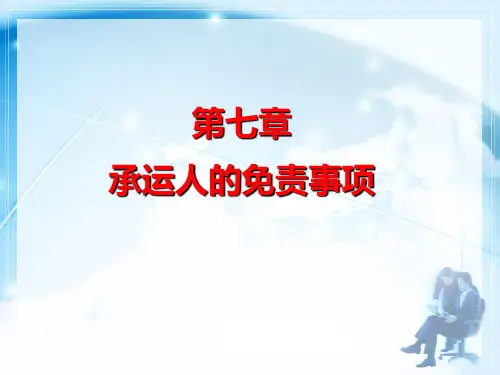
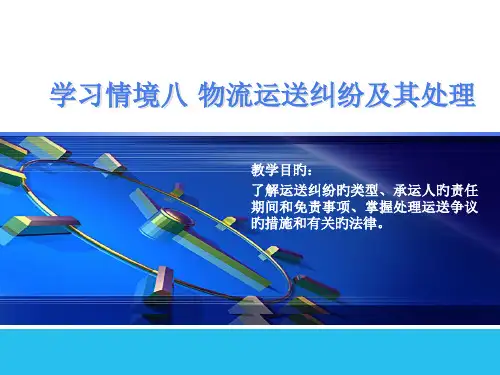
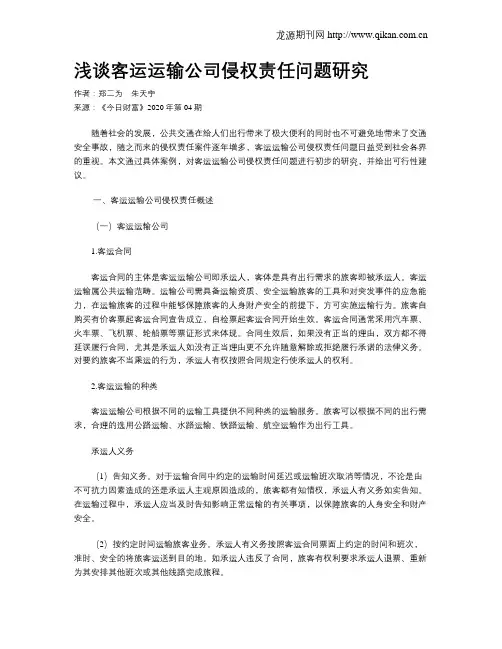
浅谈客运运输公司侵权责任问题研究作者:郑二为朱天宇来源:《今日财富》2020年第04期随着社会的发展,公共交通在给人们出行带来了极大便利的同时也不可避免地带来了交通安全事故,随之而来的侵权责任案件逐年增多,客运运输公司侵权责任问题日益受到社会各界的重视。
本文通过具体案例,对客运运输公司侵权责任问题进行初步的研究,并给出可行性建议。
一、客运运输公司侵权责任概述(一)客运运输公司1.客运合同客运合同的主体是客运运输公司即承运人,客体是具有出行需求的旅客即被承运人。
客运运输属公共运输范畴。
运输公司需具备运输资质、安全运输旅客的工具和对突发事件的应急能力,在运输旅客的过程中能够保障旅客的人身财产安全的前提下,方可实施运输行为。
旅客自购买有价客票起客运合同宣告成立,自检票起客运合同开始生效。
客运合同通常采用汽车票、火车票、飞机票、轮船票等票证形式来体现。
合同生效后,如果没有正当的理由,双方都不得延误履行合同,尤其是承运人如没有正当理由更不允许随意解除或拒绝履行承诺的法律义务。
对要约旅客不当乘运的行为,承运人有权按照合同规定行使承运人的权利。
2.客运运输的种类客运运输公司根据不同的运输工具提供不同种类的运输服务。
旅客可以根据不同的出行需求,合理的选用公路运输、水路运输、铁路运输、航空运输作为出行工具。
承运人义务(1)告知义务。
对于运输合同中约定的运输时间延迟或运输班次取消等情况,不论是由不可抗力因素造成的还是承运人主观原因造成的,旅客都有知情权,承运人有义务如实告知。
在运输过程中,承运人应当及时告知影响正常运输的有关事项,以保障旅客的人身安全和财产安全。
(2)按约定时间运输旅客业务。
承运人有义务按照客运合同票面上约定的时间和班次,准时、安全的将旅客运送到目的地。
如承运人违反了合同,旅客有权利要求承运人退票、重新为其安排其他班次或其他线路完成旅程。
(3)救助义务。
旅客在运输过程中如突发疾病、遇到危险及分娩等情况发生,承运有义务为患者争取时间、全力救助。

承运人免责-详解承运人免责(Carrier's Exceptions)目录• 1 什么是承运人免责• 2 承运人免责的情形什么是承运人免责承运人免责是指按照法律或合同的规定,在一定的情况下,承运人对货物的灭失或损坏享有免除赔偿责任的权利。
这即。
《海商法》规定承运人这一权利,实质上是对承运人的一种特殊保护措施。
《海牙规则》第4条第2款规定17项免责事由,与我国《海商法》规定大致内容相同,只是表述上有所不同。
《汉堡规则》虽取消了《海牙规则》的免责条款,尤其是废除了航行过失和管船过失免责条款,但并不是说承运人对任何事项都不能免责。
对非承运人的过失造成的货损,如天灾、战争等不可抗力或托运人的过失等造成的货损,承运人仍可以免责。
这实质意思也是同上免责一样的。
承运人免责的情形我国《海商法》第51条规定:在责任期间货物发生的灭失或者损坏是由于下列原因之一造成的,承运人不负赔偿责任:(一)船长、船员、引航员或者其他受雇人在驾驶船舶或者管理船舶中的过失;(二)火灾,但是由于承运人本人的过失所造成的除外;(三)天灾。
海上或者其他可航水域的危险或者意外事故;(四)战争或者武装冲突;(五)政府或者主管部门的行为、检疫限制或者司法扣押;(六)罢工、停工或者劳动受到限制;(七)在海上救助或者企图救助人命或者财产;(八)托运人、货物所有人或者他们的代理人的行为;(九)货物的自然特性或者固有缺陷;(十)货物包装不良或者标志欠缺、不清;(十一)经谨慎处理仍未发现的船舶潜在缺陷;(十二)非由于承运人或者承运人的受雇人、代理人的过失造成的其他原因。
从这12项免责可看出,承运人对货物在责任期间所发生的灭失或损坏是否负责,依其本人、船长、船员、其他受雇人或代理人有无过失而定,有过失便应负责,无过失便可免责;但作为例外,如果货物的灭失或损坏系船长、船员、其他受雇人或代理人在驾驶船舶或管理船舶中的过失所致,或者由于他们的过失所引起的火灾所致,承运人仍可免责。
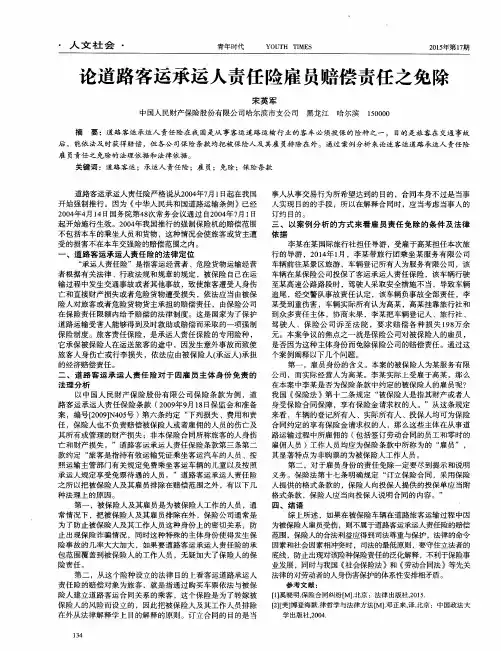
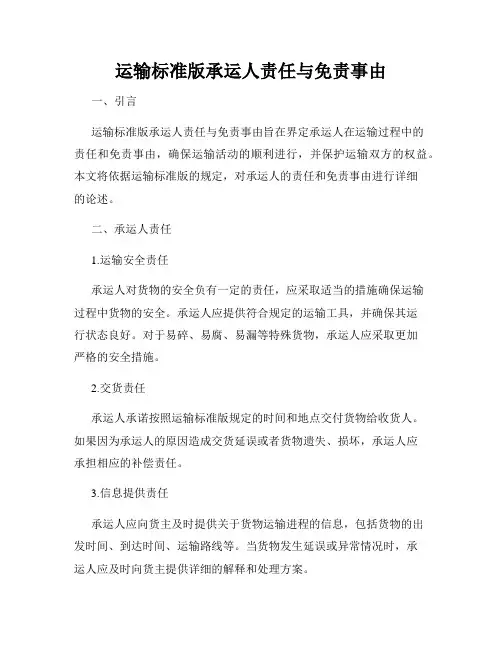
运输标准版承运人责任与免责事由一、引言运输标准版承运人责任与免责事由旨在界定承运人在运输过程中的责任和免责事由,确保运输活动的顺利进行,并保护运输双方的权益。
本文将依据运输标准版的规定,对承运人的责任和免责事由进行详细的论述。
二、承运人责任1.运输安全责任承运人对货物的安全负有一定的责任,应采取适当的措施确保运输过程中货物的安全。
承运人应提供符合规定的运输工具,并确保其运行状态良好。
对于易碎、易腐、易漏等特殊货物,承运人应采取更加严格的安全措施。
2.交货责任承运人承诺按照运输标准版规定的时间和地点交付货物给收货人。
如果因为承运人的原因造成交货延误或者货物遗失、损坏,承运人应承担相应的补偿责任。
3.信息提供责任承运人应向货主及时提供关于货物运输进程的信息,包括货物的出发时间、到达时间、运输路线等。
当货物发生延误或异常情况时,承运人应及时向货主提供详细的解释和处理方案。
4.违约责任如果承运人未按照合同的约定履行运输义务,如拒绝运输、未按时交货等,承运人应承担违约责任,赔偿货主因此而遭受的损失。
三、承运人免责事由1.不可抗力如果因为不可抗力因素导致货物运输出现异常情况,如天灾、政府行为等,承运人将免除相应的责任。
但承运人应尽力减少损失,并及时通知货主。
2.货主过错如果货主在运输前未对货物进行适当的包装、固定等操作,导致货物损坏或者对运输造成妨碍,承运人可以免责。
此外,货主对于货物价值的不准确声明也可能导致承运人在运输过程中无法提供适当的保障措施。
3.特殊情况对于一些特殊情况,如战争、罢工等,承运人有权根据实际情况决定是否继续运输。
如果承运人决定暂停运输或者更改运输方式,将免除因此而产生的责任。
4.合理限制责任根据运输标准版的规定,承运人对于货物的损失、延误等情况有一定的责任限制。
为了保证运输活动的正常进行,承运人可以根据合理的标准和限制来界定自己的责任。
四、结论运输标准版承运人责任与免责事由的制定有利于规范运输市场,保护运输双方的权益。
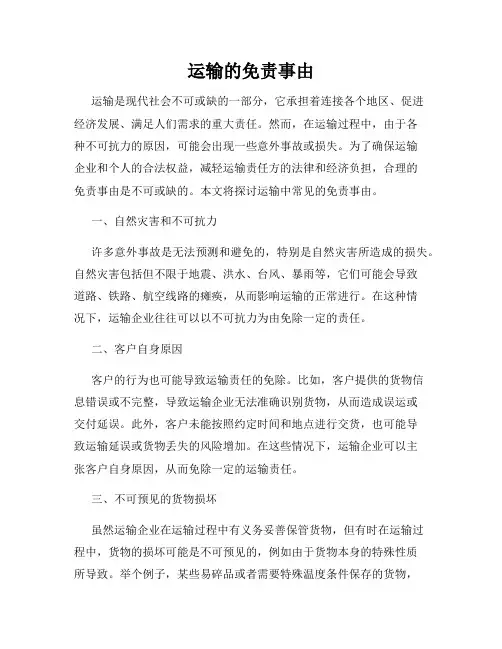
运输的免责事由运输是现代社会不可或缺的一部分,它承担着连接各个地区、促进经济发展、满足人们需求的重大责任。
然而,在运输过程中,由于各种不可抗力的原因,可能会出现一些意外事故或损失。
为了确保运输企业和个人的合法权益,减轻运输责任方的法律和经济负担,合理的免责事由是不可或缺的。
本文将探讨运输中常见的免责事由。
一、自然灾害和不可抗力许多意外事故是无法预测和避免的,特别是自然灾害所造成的损失。
自然灾害包括但不限于地震、洪水、台风、暴雨等,它们可能会导致道路、铁路、航空线路的瘫痪,从而影响运输的正常进行。
在这种情况下,运输企业往往可以以不可抗力为由免除一定的责任。
二、客户自身原因客户的行为也可能导致运输责任的免除。
比如,客户提供的货物信息错误或不完整,导致运输企业无法准确识别货物,从而造成误运或交付延误。
此外,客户未能按照约定时间和地点进行交货,也可能导致运输延误或货物丢失的风险增加。
在这些情况下,运输企业可以主张客户自身原因,从而免除一定的运输责任。
三、不可预见的货物损坏虽然运输企业在运输过程中有义务妥善保管货物,但有时在运输过程中,货物的损坏可能是不可预见的,例如由于货物本身的特殊性质所导致。
举个例子,某些易碎品或者需要特殊温度条件保存的货物,在运输过程中很容易受到损坏。
在这种情况下,如果运输企业不能证明是其故意或重大过失导致货物损坏,部分运输责任可能会被免除。
四、法律规定和政府监管运输行业受到国家法律和政府监管的直接约束。
在某些情况下,如果运输企业在合法的范围内履行了相关的手续和规定,但仍然发生了意外事故或损失,运输责任可能会被免除。
例如,国家法律规定有关运输限制或排除某些货物,而客户由于违法行为导致运输事故,运输企业可能会以遵守法律为由免除责任。
综上所述,运输中的免责事由是合理的,可以减轻运输企业和个人在不可预见的意外情况下的责任和经济负担。
但需要注意的是,免责事由并不意味着运输企业具有完全的豁免权,而是在确定责任分担上提供了一定的法律依据。
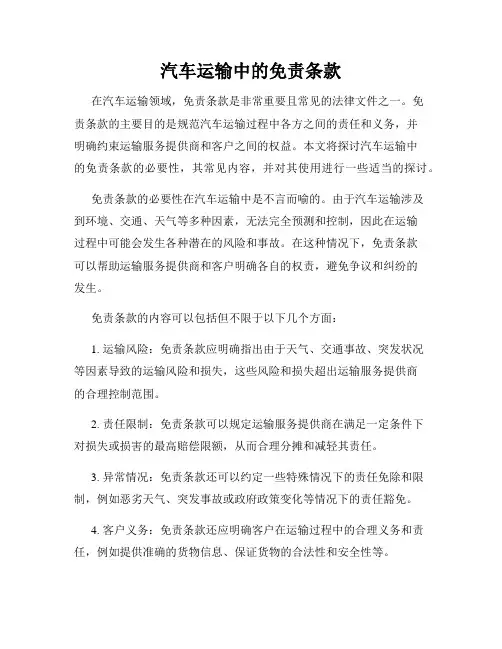
汽车运输中的免责条款在汽车运输领域,免责条款是非常重要且常见的法律文件之一。
免责条款的主要目的是规范汽车运输过程中各方之间的责任和义务,并明确约束运输服务提供商和客户之间的权益。
本文将探讨汽车运输中的免责条款的必要性,其常见内容,并对其使用进行一些适当的探讨。
免责条款的必要性在汽车运输中是不言而喻的。
由于汽车运输涉及到环境、交通、天气等多种因素,无法完全预测和控制,因此在运输过程中可能会发生各种潜在的风险和事故。
在这种情况下,免责条款可以帮助运输服务提供商和客户明确各自的权责,避免争议和纠纷的发生。
免责条款的内容可以包括但不限于以下几个方面:1. 运输风险:免责条款应明确指出由于天气、交通事故、突发状况等因素导致的运输风险和损失,这些风险和损失超出运输服务提供商的合理控制范围。
2. 责任限制:免责条款可以规定运输服务提供商在满足一定条件下对损失或损害的最高赔偿限额,从而合理分摊和减轻其责任。
3. 异常情况:免责条款还可以约定一些特殊情况下的责任免除和限制,例如恶劣天气、突发事故或政府政策变化等情况下的责任豁免。
4. 客户义务:免责条款还应明确客户在运输过程中的合理义务和责任,例如提供准确的货物信息、保证货物的合法性和安全性等。
需要注意的是,在制定和使用免责条款时,应遵循以下原则:1. 合法性:免责条款应符合当地法律法规的要求和规定,确保其合法有效。
2. 公平性:免责条款不能损害客户的合法权益,不能过度倾斜于运输服务提供商一方,应保持平衡和公正。
3. 明确性:免责条款应尽量具备明确、清晰、简明易懂的特点,避免含糊不清的措辞,以免引发争议。
4. 重要性:免责条款应以合理的方式引起客户的注意,并明确告知客户存在的免责条款,以确保客户充分了解和接受条款的内容。
综上所述,免责条款在汽车运输中具有重要的地位和作用。
它不仅可以帮助运输服务提供商和客户明确各自的权责,还能够有效降低运输过程中的风险和纠纷。
然而,在使用免责条款时应遵循相关法律法规,确保条款的合法性和公平性,同时条款的内容也需要明确、简明易懂,以便双方充分了解和接受。
汽车运输的承运人责任一、定义汽车运输是指通过道路运输工具进行货物或乘客的运输活动。
承运人指提供汽车运输服务的经营者。
二、承运人责任的基本原则1. 安全原则汽车运输的承运人应确保运输过程中的安全,包括货物和乘客的安全。
承运人应采取必要的安全措施,确保车辆和装载货物的设备符合运输标准,防止车辆故障和货物损坏,避免发生交通事故。
2. 守约原则承运人应按照合同约定履行自己的责任,确保在指定的时间内将货物或乘客安全运送到目的地。
如果发生意外情况导致运输无法完成,承运人应及时通知委托人,并采取适当的措施解决问题。
3. 不违法原则承运人在进行汽车运输时,应遵守国家法律法规以及道路交通规则,不得从事违法行为,如超速、酒驾等。
承运人应持有效的运输许可证明,确保合法经营。
三、承运人责任的范围1. 货物责任承运人对汽车运输过程中的货物负有责任。
在运输过程中,如果货物发生破损、丢失等情况,承运人应负责修复或赔偿损失。
但对于不可抗力因素导致的货物损失,如自然灾害等,承运人不承担责任。
2. 乘客责任承运人对乘客的安全负有责任。
在运输过程中,如果发生事故导致乘客受伤或财产损失,承运人应负责提供相应救助和赔偿。
但对于乘客个人原因导致的损失,如不遵守车辆安全规定或意外操作导致的伤害,承运人不承担责任。
3. 迟延责任承运人对运输延误或无法按时完成运输的责任,应根据合同约定进行赔偿或解决。
承运人应及时通知委托人,并协商解决延误问题。
四、承运人责任的限制1. 不可抗力情况当发生不可抗力的情况,如自然灾害、战争等无法预见或无法避免的事件,承运人可以免责。
但应及时通知委托人,并采取必要措施减少损失。
2. 客户过错当货物损失或乘客受伤是由于委托人或乘客个人过错导致时,承运人可以减轻责任或免责。
例如,委托人未提供准确的货物信息,导致货物装载错误。
3. 署名责任限制承运人可以通过签署运输合同或协议来限制自己的责任范围,但不能违反法律法规的规定。
承运人免责案例案例嘿,朋友们!今天来给大家讲一个超级有趣的承运人免责案例。
想象一下,有一次小李要运一批珍贵的瓷器去另一个城市参展。
他找了一家很靠谱的运输公司,满心欢喜地想着这批瓷器能安全准时到达目的地。
结果呢,在运输途中遇到了一场超级大的暴风雨,那雨下得跟瓢泼似的。
哎呀呀,这可咋办!等到了目的地一看,有些瓷器因为车子的剧烈摇晃给碰坏了。
这个时候小李就不乐意啦,他就去找运输公司理论呀,说:“你们怎么搞的呀,我这好好的瓷器怎么就坏了!”运输公司却不慌不忙地说:“嘿,这可不能怪我们呀!这是自然灾害,不可抗力呀!”这下小李傻眼了,反问一句:“难道就这么算了?”是啊,难道就这么算了?但实际上,根据相关规定,在这种不可抗力的情况下,运输公司还真有可能免责呢!就好像你走路的时候突然被一阵风刮来的东西砸到了,你能怪谁呢?只能自认倒霉呀!还有一次,小王找承运人运一批活鱼,路程挺远的。
本来一路上都好好的,结果司机开着开着车突然生病了,没办法继续开车,只好把车停在路边等救援。
这一等啊,时间过去了好久好久,等到救援来的时候,那些活鱼因为缺氧死了好多。
小王那个气呀,又去找承运人说理。
可承运人也很委屈呀,说:“我也不想生病呀,这是意外情况呀!”你说这能怪承运人吗?这就好比你去参加比赛,结果比赛前突然受伤了,那能怪谁呢?通过这些例子,我们可以看出,在某些特定情况下,承运人真的可以免责啊!这并不是说他们就可以随意推卸责任,而是有些情况真的是无法预料和避免的。
虽然可能会让我们遭受一些损失,但这也是没办法的事呀。
所以啊,我们在选择承运人的时候,一定要考虑周全,尽量把风险降到最低。
而且呀,也要多理解一下他们的难处,大家说是不是呢?。
汽车货运免责协议书甲方(承运方):_____________________乙方(委托方):_____________________鉴于甲方作为专业的汽车货运服务提供者,乙方作为货物的委托方,双方基于平等自愿的原则,就甲方为乙方提供汽车货运服务过程中可能出现的免责情形,达成如下协议:第一条免责条款1.1 甲方在运输过程中,因不可抗力因素(如自然灾害、战争、政府行为等)导致货物损失或延误,甲方不承担任何责任。
1.2 甲方在运输过程中,因乙方提供的货物信息不准确或货物本身存在缺陷,导致货物损失或延误,甲方不承担任何责任。
1.3 甲方在运输过程中,因第三方原因(如交通意外、道路施工等)导致货物损失或延误,甲方不承担任何责任。
第二条货物保险2.1 乙方应自行决定是否对货物进行保险,并承担相应的保险费用。
2.2 如乙方选择对货物进行保险,甲方应协助乙方完成保险手续,但甲方不承担因保险事宜产生的任何责任。
第三条货物交接3.1 乙方应在货物交付甲方前,对货物进行妥善包装,并确保货物信息的准确性。
3.2 甲方在接收货物时,应与乙方共同检查货物状况,并在货物交接单上签字确认。
第四条货物损失赔偿4.1 甲方在运输过程中,因自身原因导致货物损失,应按照货物实际价值进行赔偿。
4.2 赔偿金额的确定应以货物交付时的市场价值为准,或双方另行协商确定。
第五条争议解决5.1 本协议在履行过程中,如发生争议,双方应首先通过友好协商解决。
5.2 若协商不成,任何一方均可向甲方所在地人民法院提起诉讼。
第六条协议的变更与解除6.1 本协议的任何变更或补充,应由双方协商一致,并以书面形式确认。
6.2 任何一方在提前通知对方的情况下,可解除本协议。
第七条其他7.1 本协议未尽事宜,双方可另行协商解决。
7.2 本协议一式两份,甲乙双方各执一份,具有同等法律效力。
甲方(盖章):_________________ 日期:____年__月__日乙方(盖章):_________________ 日期:____年__月__日。
旅客运输合同中承运⼈的免责事由有哪些众所周知,承运⼈与旅客在签订客运合同时,承运⼈应该对旅客的⼈⾝财物安全负责,如果旅客受损,承运⼈是需要负赔偿责任的。
但在某些特殊情况下,承运⼈是可以免责的。
那么,旅客运输合同中承运⼈的免责事由有哪些呢?今天,店铺⼩编将为⼤家带来对这个问题详细的解答,具体内容请仔细阅读下⽂。
旅客运输合同中承运⼈的免责事由有哪些⼀、属旅客原因造成的损害,承运⼈免责属旅客原因不按时到站乘车的,或旅客违约在先造成的。
如旅客⽆票、持⽆效客票或不符合规定的客票乘车,或超程乘车、越级乘运⼜不补交票款的,旅客拒绝接受汽车站安检,坚持随⾝携带或在⾏李中夹带易燃易爆、有毒有腐蚀性、放射性及可能危及运输⼯具上⼈⾝和财产安全的危险物品或其他违禁物品的;旅客⾃⾝健康原因造成的。
如旅客在运输途中突发疾病,或患严重传染疾病,对公共卫⽣有重⼤影响和威胁并需强制进⾏隔离治疗的;旅客在车厢内⾃伤、⾃杀,或旅客故意违反乘车安全管理规定造成⾃⾝伤害的;旅客违法犯罪造成的。
如旅客是正在被侦查机关的犯罪嫌疑⼈或罪犯,旅客利⽤车厢进⾏⾮法活动的;旅客⾃⾝过错造成⾃带物品毁损、灭失的。
如旅客携带违禁物品被有关部门查获收缴的。
⼆、不可抗⼒免责包括两种情况:暴雪、洪⽔、台风、地震、泥⽯流等⾃然原因引起的不可抗⼒;战争、暴乱、罢⼯等社会原因引起的不可抗⼒,承运⼈不承担责任。
可适⽤公平原则来平衡旅客和承运⼈的利益三、第三⼈原因免责旅客受第三⼈侵害的情况较复杂,⼀般承运⼈不能免责。
但如果在此过程中,承运⼈对旅客尽到了告知义务、合理限度范围内的安全保障及求助义务,可减轻或免于承担责任。
要指出的是,对于上述免责事项,承运⼈应当承担举证责任。
相关法条:《民法典》第⼋百⼆⼗三条承运⼈应当对运输过程中旅客的伤亡承担损害赔偿责任,但伤亡是旅客⾃⾝健康原因造成的或者承运⼈证明伤亡是旅客故意、重⼤过失造成的除外。
前款规定适⽤于按照规定免票、持优待票或者经承运⼈许可搭乘的⽆票旅客。
简述承运人责任免除的条件。
承运人责任免除是国际货物运输中一个重要的法律原则,用于限制承运人对货物运输过程中损害或损失承担责任的范围。
承运人责任免除的条件主要有以下几点:1. 非可预见的自然灾害:如果货物运输过程中发生了非可预见的自然灾害,如地震、洪水、飓风等不可抗力事件,承运人可以免除责任。
这是由于自然灾害的发生属于人类无法预测和防止的情况,承运人无法对此负责。
2. 货物本身的特殊性质和缺陷:如果货物本身具有特殊性质或缺陷,导致货物在运输过程中发生损害或损失,承运人可以免除责任。
例如,某些物品在运输过程中容易燃烧、腐蚀或爆炸,承运人在合理的情况下可以拒绝承运或要求特殊条件运输。
3. 由货主、托运人或其他违约方引起的损害或损失:如果货主、托运人或其他违约方的行为或不当的指示导致货物在运输过程中发生损害或损失,承运人可以免除责任。
例如,货主或托运人未按照合同约定正确包装货物,导致货物损坏或丢失,承运人不承担责任。
4. 充分提供合理易得的舱位:承运人应尽合理的努力为货物提供舱位。
如果因某些不可抗力的原因,承运人无法提供舱位,从而导致货物延误或损失,承运人可以免除责任。
但是,承运人必须能够证明他们已尽最大努力提供舱位,以免被视为违约。
5. 强制法律规定的限制:根据国际法律和相关国家的国内法规定,承运人的责任可能会受到限制。
例如,根据《联合国海上集装箱运输公约》(UNCLOS)规定,对于船舶运输中损害或丢失的货物,承运人的责任主要是按照每装重量单位计算的限额责任。
以上是承运人责任免除的几个常见条件,但需要注意的是,这些条件并不总是完全适用于所有情况。
在实际应用中,具体的责任免除条件还可能因国家法律、运输方式、合同条款等因素而有所不同。
因此,在进行国际货物运输时,托运人应与承运人建立明确的合同关系,并且在合同中明确规定责任免除的条件和范围,以确保各方的权益得到充分保护。
协议编号:____________________甲方(托运方):____________________乙方(承运方):____________________鉴于甲方需要将货物通过乙方提供的汽运服务运输至指定地点,双方经友好协商,特订立本汽运免责协议,以明确双方的权利和义务。
一、协议内容1. 运输范围本协议所涉及的运输范围包括甲方委托乙方运输的货物,从甲方指定地点至乙方指定地点的全程运输。
2. 货物种类甲方委托乙方运输的货物种类包括但不限于:易碎品、液体、化学品、食品、纺织品等。
具体货物种类以甲方提供的清单为准。
3. 运输责任(1)乙方负责按照甲方提供的运输时间、路线、目的地等信息,安全、及时地将货物送达指定地点。
(2)乙方在运输过程中,对货物采取必要的安全措施,确保货物在运输过程中不受损坏或丢失。
(3)因不可抗力(如自然灾害、战争、政府行为等)导致货物损坏、丢失或延误,乙方不承担赔偿责任。
4. 免责条款(1)因甲方提供的货物信息不准确、不完整或虚假,导致货物在运输过程中出现损失、延误或损坏,乙方不承担赔偿责任。
(2)因甲方未按照乙方要求包装、捆绑、标识货物,导致货物在运输过程中出现损失、延误或损坏,乙方不承担赔偿责任。
(3)因货物本身存在缺陷、变质或自然损耗,导致货物在运输过程中出现损失、延误或损坏,乙方不承担赔偿责任。
(4)因第三方原因(如道路交通事故、货物被盗等)导致货物在运输过程中出现损失、延误或损坏,乙方不承担赔偿责任。
5. 费用及支付(1)乙方根据实际运输距离、货物种类、运输时间等因素,向甲方收取合理的运输费用。
(2)甲方应在运输合同签订后,按照乙方要求的时间节点支付运输费用。
6. 争议解决本协议履行过程中发生的争议,双方应友好协商解决;协商不成的,任何一方均有权向运输合同签订地人民法院提起诉讼。
二、协议生效及终止1. 本协议自双方签字(或盖章)之日起生效,有效期为一年。
协议期满后,如双方无异议,本协议自动续期一年。
客运承运人免责事由研究Undergraduate Thesis opening reportThesis Passenger carrier shall studyIn practice, the carrier failed to result in a comprehensive and complete fulfillment of obligations are often more complex, if all of the carrier to assume responsibility, obviously unfair.Undertake road passenger carrier within a reasonable period in the agreement or the passengers safely to the agreed location task. If the carrier is not fully and completely fulfill this obligation, whether or not to have to bear the responsibility and liability for breach of contract? Exemption under what circumstances can it?Carrier is not fully, complete the main obligations:Intentionally or negligently caused the carrier. Such as the passenger train behind schedule, delayed; vehicles do not follow the convention site parking; to provide a vehicle or service does not match the agreement; passenger traffic accidents caused by loss of personal property; due to carrier fault caused damage to baggage and other items missing.Passengers their own causes. If the passenger fails to pay or complete payment of the freight; travelers using cars for illegal activities; passengers in the compartment sudden stroke, heart disease, mental illness and other diseases; visitors alcoholism, drug abuse, suicide, fighting or deliberate violation of safety regulations and other damage caused by their own ; visitors bring their own responsibility for causing damage to items such as non-carriers.Infringement caused by third party. If the carrier can not be infringed by a third party to fulfill their obligations; passengers caused by a third party against the person and property damage (including by the trains and carriages against a third person in robbery, kidnapping, rape, detention, assault, murder etc.). Force majeure factors. As a result of war, riots, strikes, traffic congestion and other causes of vehicle can not run; running suddenly encountered heavy snow, floods, typhoons, earthquakes, mudslides, landslides, bridge collapse, the ground subsidence and other conditions caused by interruption of vehicles to run and so on.Legal provisions on exemptionsThe carrier of road passenger transport issues, "contract law" the provisions of Article zero-two, the carrier during transport passengers should be liable for damages of casualties, but the casualties are passengers own health or the carrier proves that causes casualties Passengers intentional misconduct or gross negligence is excluded. The provisions of Article Three of zero, the cabin during transport items damaged or lost, the carrier is at fault, shall beliable for damages. "Civil Law" one hundred and seventh article, performance of the contract due to force majeure or causes damage to others, does not bear civil liability, except as otherwise provided by law. Ministry of Communications "car passenger transport rules" the seventy-second article: that occur during transportation of passengers by passenger liability following conditions: Passengers without a ticket, or inconsistent with the provisions of an invalid ticket ride; conceal intoxication, malignant diseases car pollution and endanger other passengers; entrainment of dangerous goods or other prohibited articles pitted the government, on the train, checked; damage to the bus station facilities and equipment or cause injury to other passengers; self-line packages and belongings lost , damaged; bus stopover on the train on time caused not by mistake by the leakage; passenger car on the way their own casualties and damage caused by disease; the other problems occur because passengers.The carrier shall have the provisions of the law more simple. "Automobile passenger transport rules" set out in more detail though, but only ministerial regulations. Under the "Legislation Law", with ministerial regulations to the provisions of lack of effectiveness of civil exemptions.The carrier may avoid liability issues1. Is a reason for visitors. Passengers arriving on time is a reason for not traveling, or prior breach of contract caused by passengers. For passengers without a ticket, an invalid ticket or bus ticket does not meet the requirements, or exceeds the distance shipped, leapfrog not pay the fare for passenger transportation; passengers refused to accept the bus station security, adhere to the carry or in the luggage easily burning explosive, toxic corrosive, radioactive and may endanger the safety of life and property on transport of dangerous goods or other prohibited items; passengers their own health reasons. Passengers in transit, such as sudden illness, or suffering from serious infectious diseases have a significant impact on public health and the need to force and threat of isolation for the treatment; passengers in the car self-injury, suicide, or intentional violation of passenger car safety regulations caused self harm; passengers caused by illegal and criminal. If the passenger is being wanted by the investigation agencies of criminal suspects or criminals, the passenger cars for use in illegal activities; visitors caused their own fault items damaged or lost. Importation of prohibited items, such as seized by authorities seized, the line package package complete internal defects, deterioration.2. Is a force majeure. Including the two cases: Blizzard, floods, typhoons, earthquakes, landslides, caused by natural factors such as force majeure; war, riots, strikes and other social factors of force majeure, the carrier is not liable. Apply the principle of equity to balance the interests of passengers and the carrier.3. Is a third reason. Passengers by the third against the situation is more complex, common carriers can not be exempt. However, if in the process, thecarrier is doing to the obligation to inform passengers, within reasonable limits of safety and security and rescue obligations, reduce or exempted from liability. Should be noted that the above disclaimer, the carrier should bear the burden of proof, if not proof, they should bear the responsibility."Contract Law" Section 290 provides: "The carrier shall in the prescribed time or within a reasonable period of passengers and goods to the agreed place of safety." Article 302 stipulates: "The carrier shall transport the casualties to passengers liable for damages responsibility, but the injury is caused by the passengers own health or that of visitors intent, gross negligence, except caused. "" in accordance with the provisions of the preceding paragraph shall apply free of charge, discount ticket holders or permitted by the carrier aboard a passenger without a ticket. "s 121 provides: "Where a party for breach of contract caused a third person, it shall be liable for breach to the other party. and the third party dispute between, according to law or in accordance with the agreed solution." Accordingly, the carrier shall will reach the destination of passenger safety, it is the carrier's contractual obligations, failure to fulfill this obligation shall be liable for breach. Should note that the carrier assumed the passenger casualties are liquidated damages liability without fault. During transport, passengers may be due to both the casualties caused by the carrier, may not be caused by the carrier (such as third party infringement), but no matter what the reasons for, as long as no law exemptions The carrier should be liable. Such as medical expenses, lost income, expenses, the disabled living allowance, funeral expenses, etc., should be compensation by the carrier, unless the grounds of relief.① exemptions havea. Passengers their own health reasons, mainly refers to passenger illness, maternity and other reasons.b. Passenger intentionally. The so-called intentional, knowingly refers to passenger damage will occur, and the results of the implementation of this act or the occurrence of indulgence.c. Passenger gross negligence. The so-called fault is the passenger shouldbe predictable and foreseeable damage can occur due to negligence or over-confidence which led to the damage occurred. Whether gross negligence, should be specific conditions. After two defenses, the carrier shall bear the burden of proof. Carrier proves that the injury was due to a general negligence and force majeure, and not exempt.② the responsibility not only apply to ordinary visitors, but also applies to the following three special visitors:a. Free of charge in accordance with regulations, such as children under 1.1 meters;b. Discount ticket holders, such as college students;c. Without a ticket aboard the carrier's permission., "Contract Law" adopted strict liability as liability for breach of the responsibility principle, although many words reasonable grounds for the legislation, but it does exist failings, it is perhaps difficult to have everything perfect with the rules it. On balance, I believe that the principle of fault liability should be the responsibility principle, as breach of contract. First, this arrangement is conducive to the scientific achievements of debt law system; Second, this arrangement suited to China's legal environment (the reason to pursue common law strict liability, has its own cultural origins, and in order to eliminate the strict liability caused by too stringent world irrationality, the judge explained the contract has more power), which corresponds to the general public has accepted the "fault and compensation relative proportion" of the legal consciousness, to the neglect of many years of training from traditional moral values, customs and legal awareness, and undesirable: again, contract law itself implies the meaning of freedom and autonomy are also calling for essentially the application of fault liability; Finally, the practical application of fault liability from the point of view, as the principle of attribution is appropriate. In view of this, I tend to agree with the fault principle to replace the strict liability. Adhere to the premise of this theory, think again involved in legal relations case, some confusion can be solved. In short, the taxi driver not at fault, so in accordance with the principle of fault liability should not be held responsible. Let us imagine some extreme examples, such as being the culprits robbed a taxi, passengers injured, through no fault of the drivers for this result, are under strict liability for the existing contract law, taxi-owned company still be liable for damages? No doubt this theory to the carrier's obligation to impose too heavy, and require them to the safety of passengers and the extra force can not be the concern of lack of impartiality. But if the responsibility for wrongs, there is room for maneuver. In other words, the consequences of the carrier and the passengers were not at fault for injury, but such cases are not acts of God, at this moment, there is a fair responsibility for the space to display their fists. Specific, can not find the perpetrators of the occasion, and both parties are not at fault for damage tobe measured by the court as appropriate, fair at the break, to avoid the application of strict liability in the stretched time (both must apply strict liability, The responsibility to apply fair and objective can not) or hat and no cattle (rigid application of strict liability, demanding the carrier) and dash of helplessness! Cheng course called "resentment has a head, bonds are the main" If the perpetrators can be brought to justice, let it bear the direct resultof their victimization by the damage effects, is the most natural and smooth the ends. But in real life, the perpetrators fled the situation every day, nor rare, our study is that in such situations, the law should be how to make quick and effective response!In the current "contract law" adopted strict liability as the default Liability principles of the judicial process in the practical application of the law should be strictly in accordance with the law of course. But whether it is by strictliability, or responsibility for wrongs, the law should work to achieve as much as possible to pursue and even fairness, justice, efficiency, the most fundamental and natural value!。